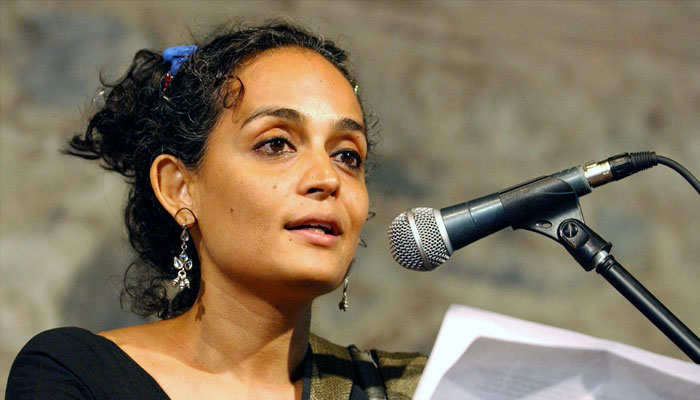Same old Modi
Indian Prime Minister Narendra Modi’s first two terms saw massive crackdown against dissenting voices
Delhi Lieutenant Governor Vinai Kumar Saxena has sanctioned the prosecution of Indian author-activist Arundhati Roy and Sheikh Showkat Hussain, a former professor in Indian Occupied Kashmir, under the notorious Unlawful Activities (Prevention) Act (UAPA) for allegedly making provocative speeches at an event in New Delhi in 2010. Indian Prime Minister Narendra Modi’s first two terms saw massive crackdown against dissenting voices, particularly those who spoke up for Muslim rights and Occupied Kashmir. It seems his third stint will be no different. Going after an author like Roy for a speech given 14 years ago is the sort of typical harassment fascists use to silence dissent. Roy had said that Kashmir “has never been an integral part of India”. An FIR filed in 2010 claimed that Roy’s speech, and a number of others, “jeopardised public peace and security” by advocating for the separation of Kashmir from India. Arundhati Roy became the first Indian citizen to win the prestigious Booker Prize in 1997 for her novel The God of Small Things but under the draconian UAPA, she could now face extreme punishment. This is a reminder that Modi 3.0 might not be much different from his previous two regimes despite the fact that the Indian voter did not give him or his party, the BJP, a simple majority. Despite Brand Modi facing a hit in the election results, Modi is hell-bent upon doing the same things he did in his previous tenures.
Modi 3.0 has also retained the top four ministries – External Affairs Minister Jaishankar who remains head of India’s foreign policy, Amit Shah remains India’s home minister, Nirmala Sitharaman finance minister and Rajnath Singh as defence minister – apart from key infrastructure ministries that are largely the same as well. Another thing that stands out is that there is no Muslim minister in this Modi cabinet – not even a token name. According to the Indian media, this is the first time since independence that no Muslim MP has taken oath as minister after the elections. Modi had one token Muslim minister each in his previous two cabinets. Not that it saved Muslims from being lynched or targeted and harassed by Modi supporters. Some believe that since such tokenism did not change the reality of Modi’s Hindutva rule where Muslims were treated worse than animals, it’s probably for the better that such tokenism has been done away for good. However, it also shows that we should not expect anything new from the Modi government.
After the shocking elections results where the BJP could not secure a simple majority on its own and had to go for a coalition government out of necessity rather than strategic purposes like in Modi’s past two tenures, there were hopes that the BJP would introspect on why it didn’t do well in the 2024 elections. There are two views on this: one, the Modi government is ‘pretending’ that it remains unaffected even after the results when it actually is reeling from the shock of it, and two, Modi 3.0 may just react more ruthlessly given the resounding electoral setback. Pundits are hopeful that with a strong opposition in parliament after a long time, Modi will not be able to bulldoze legislation like he did in his previous two governments. This time, they say, things will be different. For the moment, however, it seems as if Modi has not learnt any lesson and will continue to wage a war on India’s Muslim citizens and India’s dissenting voices a la Arundhati Roy. Modi 3.0 will most likely be another disaster for critical voices in India and its minorities.
-
 Celine Dion Reveals Music She's Listening To Lately
Celine Dion Reveals Music She's Listening To Lately -
 HR Exec Kristin Cabot To Speak At Crisis PR Conference After Coldplay Incident
HR Exec Kristin Cabot To Speak At Crisis PR Conference After Coldplay Incident -
 Why Travis Kelce Says Taylor Swift Has Made Him 'so Much Better'?
Why Travis Kelce Says Taylor Swift Has Made Him 'so Much Better'? -
 Halle Berry Credits This Hairstyle With Launching Her Acting Career
Halle Berry Credits This Hairstyle With Launching Her Acting Career -
 Hailee Steinfeld Spills Her 'no-phone' Rule With Husband Josh Allen
Hailee Steinfeld Spills Her 'no-phone' Rule With Husband Josh Allen -
 Bowen Yang Gets Honest About Post SNL Life: 'It’s An Adjustment'
Bowen Yang Gets Honest About Post SNL Life: 'It’s An Adjustment' -
 Charlize Theron Delivers Strong Message At 2026 Winter Olympics Opening Ceremony
Charlize Theron Delivers Strong Message At 2026 Winter Olympics Opening Ceremony -
 Lil Jon Reacts To Son Nathan Smith's Death: 'Devastated'
Lil Jon Reacts To Son Nathan Smith's Death: 'Devastated' -
 Bianca Censori Reveals Where She And Kanye West Stand On Having Children Together
Bianca Censori Reveals Where She And Kanye West Stand On Having Children Together -
 Taylor Swift Hypes Olympic Athletes In Surprise Video Message
Taylor Swift Hypes Olympic Athletes In Surprise Video Message -
 Timothy Busfield Charged With Four Counts Of Child Sexual Abuse
Timothy Busfield Charged With Four Counts Of Child Sexual Abuse -
 Amy Schumer Explains Why Her Sudden Photo Surge Is ‘not A Cry For Help’
Amy Schumer Explains Why Her Sudden Photo Surge Is ‘not A Cry For Help’ -
 Kanye West First Contacted Bianca Censori While In Marriage To Kim Kardashian?
Kanye West First Contacted Bianca Censori While In Marriage To Kim Kardashian? -
 Travis Kelce Reveals What His Nieces Really Do When He, Taylor Swift Visit
Travis Kelce Reveals What His Nieces Really Do When He, Taylor Swift Visit -
 Lola Young Makes Career Announcement After Stepping Back From Touring
Lola Young Makes Career Announcement After Stepping Back From Touring -
 Priyanka Chopra Shares Heartfelt Message For Nick Jonas
Priyanka Chopra Shares Heartfelt Message For Nick Jonas




